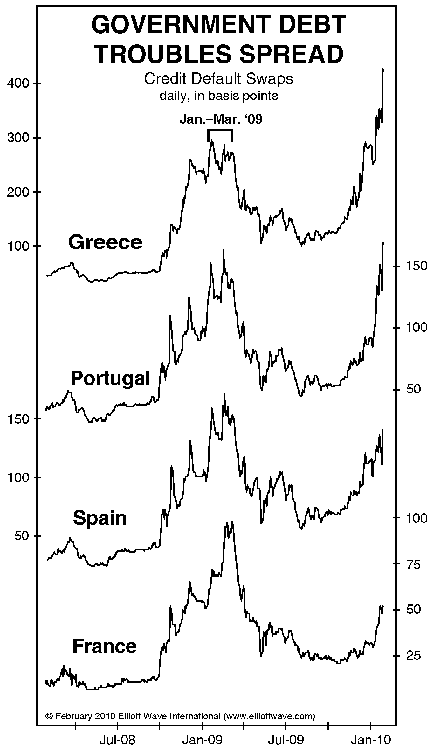Debt crisis in the headlines of the mainstream media again. Why do we care about the debt of Greece? Portugal? Spain? Why is high levels of debt deflationary? How can this excessive debt effect global recovery? We got help from Elliott Wave International to answer these questions.
Credit Default Swaps Indicate Trouble for European Debt
Government debt is no longer just a problem for emerging countries. Portugal, Spain, France and Greece (as we have seen in recent weeks) are living in fear of credit default. Consequently, the value of their credit default swaps is skyrocketing.
The following is an excerpt from the February issue of Global Market Perspective. For a limited time, you can visit Elliott Wave International to download the rest of the 100+ page issue free.
High levels of global debt are both financially debilitating and deflationary because they commit scarce cash to servicing interest payments. Up until now, most sovereign credit defaults occurred in emerging-market countries, such as Argentina and Russia. The deflationary tide, however, is starting to lap up against more developed Eurozone economies.

The chart shows the value of credit default swaps — an instrument similar to an insurance contract that pays holders (if they are lucky) in the event of default — for Greece, Portugal, Spain and France. In recent weeks these contracts have soared, with credit-default swaps on Greece’s and Portugal’s debt already surpassing the January-March 2009 extremes established in the latter part of Primary degree 1 down.
Obviously, the market is growing more skeptical that Greece can pay its debts, so the cost of protecting against default is rising fast. Greece’s budget deficit is 12.7% of gross domestic product, and Portugal faces a budget shortfall that’s more than twice the European Union’s limit. Traders are now buying default protection on sovereign debt at a rate of more than five times that of specific company bonds. “Greece’s neighbors would ‘step in’ to prevent a debt default to avoid ‘a problem for the whole of Europe,’” a Tokyo-based bondsalesman says. Maybe so, but who will step in to bail out Portugal, Spain, the next sovereign default or the one thereafter?
The world is running out of money to service its mounting debts, and this chart simply depicts the front edge of the next great wave of credit contraction, which will sweep into more established countries throughout Europe and eventually to the United States.
Read the rest of this issue now free! You’ll get 100+ pages of insights about:
- World Stock Markets
- Global Interest Rates
- International Currency Relationships
- Metals and Energy
- Social Trends and Observations
- More
Visit Elliott Wave International to download your free 100+ page issue.
Elliott Wave International (EWI) is the world’s largest market forecasting firm. EWI’s 20-plus analysts provide around-the-clock forecasts of every major market in the world via the internet and proprietary web systems like Reuters and Bloomberg. EWI’s educational services include conferences, workshops, webinars, video tapes, special reports, books and one of the internet’s richest free content programs, Club EWI.